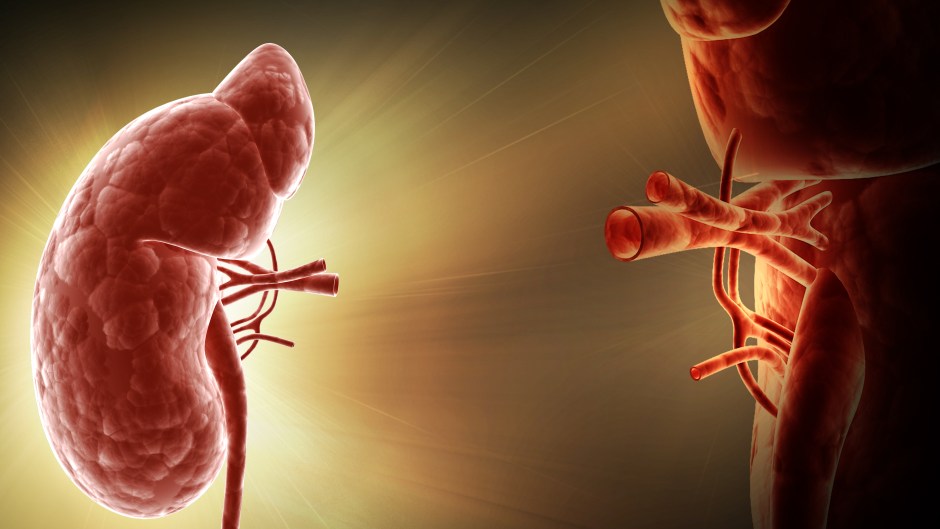
A kidney transplant is a surgical procedure to place a healthy kidney from a living or deceased donor into a person whose kidneys no longer function properly.
The kidneys are two bean-shaped organs located on each side of the spine just below the rib cage. Each is about the size of a fist. Their main function is to filter and remove waste, minerals and fluid from the blood by producing urine.
When kidneys lose this filtering ability, harmful levels of fluid and waste accumulate in body, which can raise the blood pressure and result in kidney failure (end-stage renal disease). End-stage renal disease occurs when the kidneys have lost about 90% of their ability to function normally.
Common causes of end-stage kidney disease include
-
Diabetes
-
Chronic, uncontrolled high blood pressure
-
Chronic glomerulonephritis — an inflammation and eventual scarring of the tiny filters within kidneys (glomeruli)
-
Polycystic kidney disease
People with end-stage renal disease need to have waste removed from their bloodstream via a machine (dialysis) or a kidney transplant to stay alive.
Types
-
Deceased-donor kidney transplant
-
Living-donor kidney transplant
-
Preemptive kidney transplant
Why kidney transplant ?
A kidney transplant is often the treatment of choice for kidney failure, compared with a lifetime on dialysis. A kidney transplant can treat chronic kidney disease or end-stage renal disease to help you feel better and live longer.
Compared with dialysis, kidney transplant is associated with
-
Better quality of life
-
Lower risk of death
-
Fewer dietary restrictions
-
Lower treatment cost
Some people may also benefit from receiving a kidney transplant before needing to go on dialysis, a procedure known as preemptive kidney transplant.
But for certain people with kidney failure, a kidney transplant may be riskier than dialysis. Conditions that may prevent you from being eligible for a kidney
transplant include
-
Advanced age
-
Severe heart disease
-
Active or recently treated cancer
-
Dementia or poorly controlled mental illness
-
Alcohol or drug abuse
-
Any other factor that could affect the ability to safely undergo the procedure and take the medications needed after a transplant to prevent organ rejection
Only one donated kidney is needed to replace two failed kidneys, making living-donor kidney transplantation an option.
About Recovery
You may be able to get out of bed and walk around the day after your transplant. Most people stay in the hospital for 5 days or less.
Although you should start to feel much better in about 2 weeks, you won’t be able to drive or lift heavy objects for about a month. Your doctor will probably advise you to take off work for 6 to 8 weeks.
To stop your body from rejecting the donor kidney, you’ll need to take a special medication every day. At first, you may also have to visit your doctor 2 to 3 times each week to make sure your body is healing the way it should. Over time, these visits will become much less frequent.
You’ll recover faster if you stay active. Your doctor will tell you what exercises are safe to do and for how long. Many people start with walking and stretching, then slowly build up to longer and more intense workouts. Owever, contact sports, like soccer and football, will be off limits, since you could harm your donor kidney.
Giving up smoking and alcohol are key to stay healthy. You may also think about talking to a dietitian about healthy meal planning. You’ll be able to eat more fruits and vegetables and drink more liquids than someone on dialysis. However, you’ll also need to choose foods that can keep your blood pressure low and blood sugar stable.
Risks after kidney transplant
Having a kidney transplant puts you at risk for health problems like high blood pressure and diabetes. You’re also more likely to get infections.
There’s also a chance that your body could start to reject the donor kidney. If so, you could experience:
-
Feugh
-
Vover
-
Comiting
-
Nausea
-
Pain, especially while peeing
-
Producing less urine than normal
If you notice any of these signs, you’ll need to call your doctor right away. But many people who have a kidney transplant do very well.




